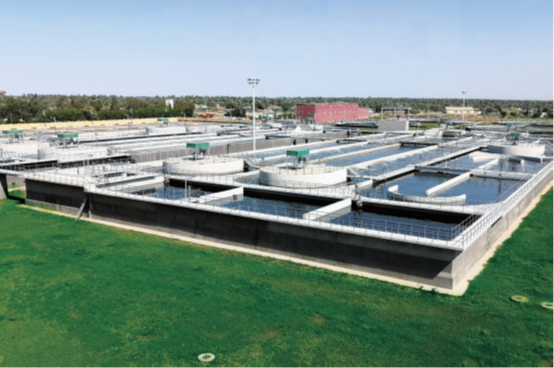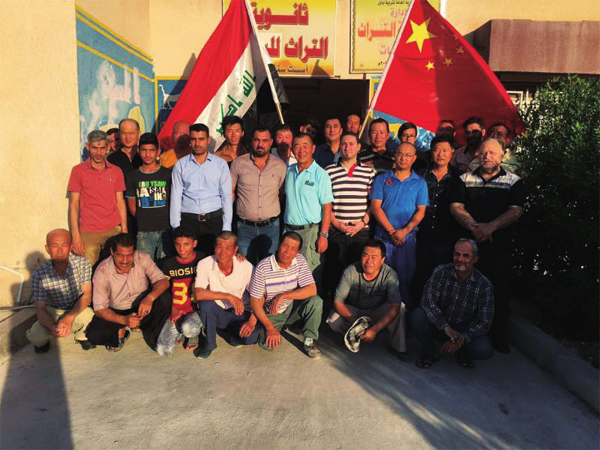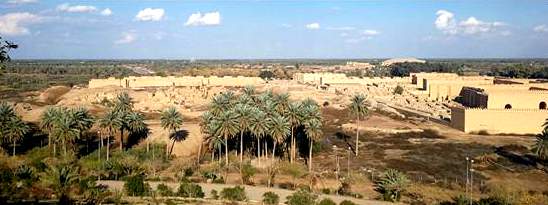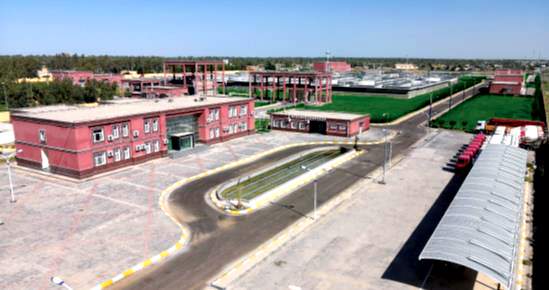Hillah Gets Its "Water Filter"
By Ma Li Wenbo
[Iraq] Saad Tayy Madi
The city of Babylon in Mesopotamia with its long history is one of the cradles of ancient human civilization. It is also the city where the Hanging Gardens, one of the seven wonders of the ancient world, were said to be located centuries ago. The Hanging Gardens of Babylon indicated that even in ancient times the people there knew how to harness water resources for irrigation. However, 2,600 years later, the city of Hillah in modern-day Iraq, near where the Hanging Gardens of Babylon used to be, struggled to cope with rainwater and sewage due to the years of war.

The end of the Iraq War finally gave Hillah some breathing space and the people dispelled from the city gradually returned home. However, the arrivals put more and more pressure on the fragile urban rainwater and sewage treatment system, and the people who returned home for the love for their country were forced to live in a polluted environment due to the lack of basic sanitation.
Sewage Becomes Clean as Tap Water
One of the returnees, a man named Mohammed, decided to throw a banquet for his relatives and friends to celebrate his return.
When his guests arrived and the party began, something embarrassing happened. The septic tank in Mohammed's courtyard was full and an overpowering stench filled the house, instantly turning the warm family gathering awkward.
Mohammed called the town sewage disposal team, whose telephone number he knew by heart. To his chagrin, even after a long period of waiting, the team didn't come and the guests left reluctantly.
The family reunion, meant to be a festive occasion, was ruined.
In those years, many other Hillah residents went through similar experiences. There was only one simple sewer system serving the eight districts of Hillah at that time and most households had to install septic tanks in their courtyards to store the refuse. In the rainy season, the rainwater would cause the tank to overflow, necessitating frequent calls to the sewage disposal authorities, asking them to send over their sewage disposal trucks to empty the tank by using suction pipes and cart the refuse away.
The catch was that few people could avail of this method of disposing of their refuse due to two main reasons. The fee for clearing the sewage by suction was so expensive that most people could not afford it. Besides, there were only a few dozen sewage suction trucks in the city and they remained too busy to handle such house calls.
Even more worrying was the fact that the residents couldn't find any difference in the quality of the town wastewater even after it was treated for purification. There was only one small sewage treatment plant that had been built 30 year ago and its daily processing capacity was low, the equipment was primitive and the treated water was still unhealthy.
The residents could only watch the outflow of sewage helplessly. The deteriorating living conditions posed a serious threat to their health, exacerbating their worries.
Every time the streets overflowed with sewage, people would protest, clamoring for the government to solve the problem. However, the postwar government of Iraq was unable to tackle public health problems since it was preoccupied with responding to the threat of terrorism and trying to fill the huge gap in the funding needed for urban reconstruction.

The Hillah sewage treatment plant in Iraq
In the midst of this grim picture, a Chinese company was contracted to build a sewage treatment plant in Hillah. When the residents heard the good news, they were delighted, discussing it everywhere they went.
So great was the joy that when the work began, wherever the project staff went, they would be plied with food and water. This was the city's most ardently desired project as they wanted nothing more than to get rid of the filth and underdevelopment.
By the end of 2017, the plant was ready. The company, China Nation l Electric Engineering Co. Ltd (CNEEC), installed the most advanced carrousel oxidation ditch system in its sludge and rainwater treatment plant, transforming the primitive sewage treatment system into an advanced international system that brought comfort and convenience to Hillah residents.
"This looks like tap water," the then director general of Iraq's Administration of Sewage said in delight as he watched the treated rainwater trickle out.
From the new sewage treatment plant, the treated water flows into the Hillah River, increasing the volume of the river that had become low due to desertification, and improving its water quality.
In the next 25 years, the new plant will treat the sewage generated by 500,000 people. Thanks to the plant's high treatment capacity, Hillah can develop a citywide sewerage system to provide the basic amenity to more people who are returning to rebuild their hometown.
Besides the plant, the rainwater and sewage discharge system also includes a network of pipes and pump stations designed by the Chinese company. When the entire project is completed, Hillah residents can say goodbye to the septic tanks forever and the city's rainwater and sewage discharge capacity will reach an advanced international level.
"When the economy nearly collapsed during the war on terrorism, CNEEC didn't leave. Instead, it overcame all sorts of difficulties to complete the Hillah project. This is a Chinese miracle," the then committee chairman of Babil, a province in central Iraq, said when he visited the project.
As for Mohammed, his response was, "I'm now going to throw another party to celebrate my clean home!"
Standing Together in Times of War
The transformative sewage system didn't appear out of nowhere.It was jointly built by the Chinese and Iraqis.
The five-year construction was severely challenged by the war.
In 2014, Iraq was threatened by terrorism again. With the nearest battlefield less than 100 km away, the shadow of war fell on the project site. There were all kinds of rumor, making everyone feeling anxious. Many foreign-funded enterprises left Iraq.
But the Chinese builders chose to remain in this crisis, weathering the hard times with the Iraqis.
Misfortunes never come singly. The war crisis hadn't been solved yet when the financial difficulties came.
The government of Iraq cut off its funding for the project. The Chinese enterprise carefully considered the situation and reached the conclusion that if the project really benefited Hillah residents, its significance would far exceed the payment issue.
They therefore made the bold decision to raise RMB70 million (USD9.91 million) by themselves to advance the project.
The project's continued progress not only gave Hillah residents hope for a better homeland, but also gave many displaced people who had lost their homes renewed confidence in life and the future.
“The Chinese company led us to overcome difficulties until our country was rebuilt,” Sami, a worker at the Hillah sewage treatment plant, said.
Sami had fled from Mosul, a major city in northern Iraq, after it was occupied by the enemy. He lost two brothers during the turmoil. He is the breadwinner for three families, bringing up seven children, including four of his brothers'. Since he arrived in Hillah and found a job in the sewage treatment plant, Sami has grown optimistic about life.
There are 15 displaced people including Sami working at the sewage treatment plant.
The Chinese company, after learning of their plight, gave them a wage advance to tide them over their difficulties. The displaced men have been working hard and efficiently to repay the kindness, giving the best performance among all local workers.
In July 2017, when Iraq celebrated the recovery of Mosul, the displaced workers who had come from the city were ready to go back. Brimming with joy and excitement, they put on their best clothes and brought their families to the plant to say goodbye.
With affectionate hugs and warm handshakes, they repeatedly invited their Chinese colleagues to visit them in Mosul.
Five months later, Iraq had finally won the war against terrorism. The sewage treatment plant project had also been completed after enduring the hardship.
A Park in a Sewage Plant
Inside the Hillah sewage treatment plant, it is like a park with luxuriant flowers and plants and a large fountain where birds abound. Shining stainless steel fencing surrounds the "park". It is hard to imagine that this is actually a sewage treatment plant. Next to it stands a school, the Taurasi High School, also in picturesque surroundings.
You can see the students reading on the benches, chatting or reading. Some are playing badminton in the court. The school toilets are spanking clean. There is laughter and a cheerful din all round.
However, things were different in the past.
The Taurasi High School, with over 1,000 students, was renovated in sync with the sewage plant. The project staff often found teachers from the school bringing the students over to the plant to take group photos since the graduating students wanted mementos of the plant that had changed the environment of Hillah before they left the school.

A group photo of the principal and students of the Taurasi High School and Chinese employees of the plant
One day, the principal of the school knocked on the door of the project team, asking them to help renovate the school. The ancient hardware was failing, creating many problems. For example, the toilets would often get choked up. The failing facilities created a poor learning environment.
The project team immediately deployed more than half of the construction manpower to renovate the school thoroughly.
Several months later, the school had a new look. The playground looked new with the stagnant water standing in it cleared, the lights had been replaced and vertical air conditioners had been installed. A concrete badminton court had been built and the toilets had been rebuilt. The teachers and students could hardly believe their own eyes when they saw all the changes.

At the site of the Hanging Gardens of Babylon
As the company renovated the Taurasi High School, the story of their philanthropy spread in Babylon as well as outside the city.
The company was invited by Hillah's top religious leader to a meeting after he came to know the story. Iraq's governmental authorities called the plant a model foreign-funded project and the management of other sewage plants paid visits.
The Hillah sewage treatment plant is China’s largest project in Iraq to improve people’s lives. It has an important role in improving Iraqi lives and has become a symbol of Chinese tenacity and dedication.
As Chinese like to say, "A bit of fragrance always clings to the hand that gives a rose."
Providing clean homes and clean water to the ancient city of Hillah and showing perseverance in difficult times, the Chinese people have demonstrated their sincere friendship with the people of Iraq. Together, they will witness a brighter future.

The Hillah sewage treatment plant in Iraq
FOR MORE
Project Overview
The Hillah sewage treatment plant in Babil Province in Iraq, contracted by China National Electric Engineering Co. Ltd., was completed in 2017. The Iraqi government plan envisioned initially building a plant that can treat 100,000 tonnes of sewage every day, followed by the construction of an auxiliary network of pipes and pump stations.
The USD89-million project, covering an area of 150,000 sq m and with a daily processing capacity of 107,000 cu m, is located about 10 km southwest of Hillah. In the next 25 years, it will handle the sewage generated by 500,000 Hillah residents. The project also includes the design for a 400-km network of pipes to collect sewage and rainwater, 19 auxiliary sewage pump stations and 14 rainwater pump stations.


